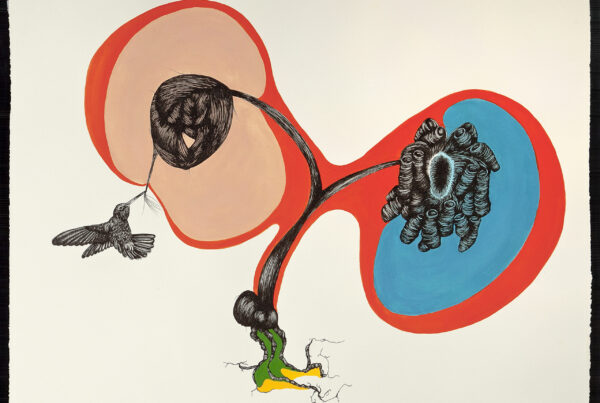The case of gold-extraction in Halkidiki is only one chapter in the “book of dispossessions” in Greece during the crisis period. Land, natural resources and public infrastructure in Greece comprise investment targets for local and international speculative capital; their current exploitation is now taking place to unprecedented extent, intensity and geographical spread.*

The Skouries mining project in June 2014. Source: hellas-gold.com
In Halkidiki (northern Greece), from 2010 on, local communities have been resisting the transformation of their land into an open cast gold extraction mine of the Canadian company ‘Eldorado Gold’. The Cassandra mines in the area of Halkidiki have operated since 6th century BC, and from 1950 up to the present date, national and international consecutive companies continue the extraction of metals mainly in caves. Mining activity has been tolerated by local communities, as it created employment locally. Yet, the present case is different.
In 2011, following a long story of ambiguous government decisions and scandalous agreements, the Greek state agreed to long-term contracts for the exploitation of the deposits. This happened at a sum of 11 million euros while ceding 31.000 ha. The new extraction method is also very problematic: Open-pit gold-copper ore mine together with flash melting can lead to the implementation of —potentially poisonous— cyanide. The method creates irreversible and negative consequences on the local environment. These, together with the negative social and economic impacts expected, have mobilised thousands of local communities’ residents to fight against the project.
The case of gold-extraction in Halkidiki is only one chapter in the “book of dispossessions” in Greece during the crisis period. The exploitation of land, natural elements, and public infrastructure nowadays in Greece comprise investment targets for local and international speculative capital, to an unprecedented extent, intensity and geographical spread. Land dispossession is not a simple outcome of Greece’s obligation to repay its debt. In fact, there is a significant change in how socio-spatial relations are governed within the current crisis. A new pattern is being created and is radically different from the traditional one that covered the long period between the end of the Greek civil war (1949) and the beginning of the public debt crisis in 2009. This new pattern is based on big foreign and domestic investments, land grabbing through privatisation schemes, and efforts to extract monopoly rents.
Are these processes part of what Naomi Klein has described as disaster capitalism (“the rapid-fire corporate re-engineering of societies still reeling from shock”)? I argue that the social and ecological catastrophe which local and international elites imposed upon Greece is a systemic process to make sure the European neoliberal model could be sustained. In this context, disaster capitalism is translated into specific policies that are justified, rendered legal and almost natural, so that the homo economicus of the neoliberal era can go on with business-as-usual. In this sense, we see capitalism’s tendency to also “create” disasters: new forms of enclosures, new modes of realising higher profits that contribute to renewed socio-environmental crises.
De-regulating and re-regulating sociospatial relations
Small-scale land ownership was a common form of property arrangement since the establishment of the independent Greek state in 1830, and even more so after the Second World War. This system was based on the widespread distribution of rent across different social classes and on high profits for the small-scale construction industry that became the engine of the Greek economy.
Since May 2010, the legal system in the country has drastically changed. This reshaped every aspect of the Greek economy and society over a few months, with standard parliamentary procedures often being ignored. The dominant “success story” of austerity in Greece posits the de-valorisation of land and land-related resources. As a result, land dispossession is rapidly increasing. For example, land and housing values have lost 20–35% of their commercial value since 2008. At the same time, the devaluation of land is linked to policy changes proposed through austerity packages that specifically impose massive public land privatisations. Urban and regional policies barely resemble the regulatory and governing systems in place 5 years ago. In fact, urban and rural space is being actively remade through a rapid intensification of the legislative process. The majority of laws that lead this remaking are a direct product of the monetary fiscal policies implemented by Greece’s EU creditors.
In addition to land de-valorisation, a program involving mass privatisation of state-owned assets has been imposed (see for details the Asset Development plan of the 3rd MoU between Greece and its creditors). A big part of these assets consists of real estate. The process is managed by the Hellenic Republic Asset Development Fund (HRADF – in Greek: TAIPED). TAIPED was legally established in 2011, under the so-called ‘medium-term fiscal strategy’. This allows project-led planning inside the boundaries of TAIPED properties, distinct from a plan-led planning system for the rest of national territory. In particular, the intensive land uses applied to TAIPED properties are shaped to facilitate the implication of an investment plan. This is seen by investors as the biggest advantage of the new legal framework.

A young boy in Ierissos, Halkidiki wearing the famous SOS Halkidiki (motto of the local movement) sweater. Source: http://oikotrives.gr
Moreover, the legal framework surrounding TAIPED real estate, provides higher ratios for floor area and other preferential regulations, including prioritisation in licensing procedures, amending existing land or urban planning rules, exemptions from limits to building heights, and exemptions from other fees. The introduction of leaseholds for periods of 99 years, marks the first time such leases have existed in Greek property law. These changes are aimed at providing investors with ample time for amortisation and to increase profits, useful for securing future financing of building construction.
In sharp contrast with previous development planning, which centred on small-scale land owners and small building projects, the new projects by international or domestic investors focus on larger land parcels and on the fortification of segregated spaces as privileged enclaves —emerging in contrast to more humble urban and rural environments. New zoning allowances are also noticeable, as the old urban planning laws that once protected the historically significant territorial sites from urban sprawl are eroded by a new legal framework, promoting the urbanisation of highly valued environments —effectively the “best” places in the country. As a result, the extraction of monopoly rent from new real estate investments is becoming the dominant source of rent in Greece.
The tendency is towards flexibility and special provisions in favour of private investments. A dual urban development system has been effectively implemented through the introduction of two new kinds of plans: the Local Spatial Plan (LSP); and the Special Spatial Plan (SSP). The LSP defines land uses, determines building densities and designs the general urban growth pattern of a city. It is supposed to be the main urban planning tool. However, according to the new law, a simple ministerial decree can make changes to the plan without seeking the legally required consent of local communities. The SSPs are plans for large investments in tourism, industry, and commerce. Through the SSPs, certain provisions of the Local Spatial Plans (LSPs) can be bypassed, or even annulled, to attract investment.
In effect, an attempt to bypass conventional bureaucracy in the planning system has led to an unconditional acceptance of exemptions and special measures for those who can afford to invest —namely, the rich. Aspects of spatial cohesion, environmental protection, and socio-economic justice are rejected in the spirit of “building everything” to overcome the crisis.
Final thoughts
The uneven spatiality of a TINA (There Is No Alternative) logic produces a sharpened process of uneven development, where the concentration of wealth sits at the top 0.1% of the population —rather than an already hideous 1%, recognised elsewhere. What is also clear (not only in the case of Greece), is that the current policy repertoire to tackle this pattern of development is inadequate: increase of unemployment, the gutting of the welfare state, and privatisation of public land and infrastructure, are all central to its logic. We cannot overstate how the EU project is, essentially, dominated by political-economic elites, who are attempting to create and prioritise a new space of accumulation in Europe: namely, Greece.

An activist in front of an excavator in the Skouries forest. Source: http://www.alterthess.gr/
Is this strategy unchallenged? In Greece, during the crisis period, intense socio-ecological movements (such as the anti-gold initiative in Halkidiki) have shown up to question this kind of rationalities and, not only fight for but also “produce radically new environments against the dominant ones”. These movements and protests brought up a significant change against the neoliberal “TINA” framework: they are keeping democracy and “the political” alive.
These new social and socio-ecological movements have a threefold importance: a) they put into practice democracy and democratic procedures at all levels, b) they challenge power relations and alienation that capitalism produces, and c) they fight for an “open future”: a potential for the world to be radically different. As political ecologist Alex Loftus argues, this desire for an open future is “a commonplace one: nearly always more a stifled anger than a revolutionary cry, the challenge, surely, is to understand the movement of this anger, to learn from it, to build on it, and transcend it in both humble and democratic ways.”
* This post is part of a series sharing chapters from the edited volume Political Ecology for Civil Society. Giorgos Velegrakis’ contribution is included in the chapter on ‘disaster capitalism’. We are eager to receive comments from readers and especially from activists and civil actors themselves, on how this work could be improved, both in terms of useful content, richness of examples, format, presentation and overall accessibility.




